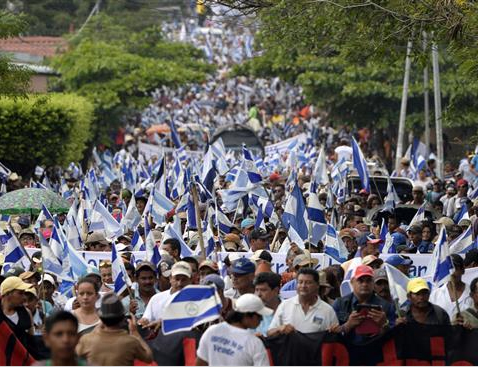by the El Reportero’s wire services
Thousands of people took to the streets of Juigalpa, a city in central Nicaragua, for a march against the inter-oceanic canal being built by China’s HKND Group.
People from across Nicaragua, the majority of them peasants, traveled to Juigalpa for Saturday’s march.
The protesters demanded that President Daniel Ortega’s administration cancel the project because it will push farmers off their land and harm the environment.
The peasants are unhappy about a provision of the canal law that effectively compels residents along the route to sell their land to Hong Kong-based lead contractor HKND Group at whatever price the company offers.
The marchers carried signs that said “Ortega Sellout” and “Out with the Chinese,” and they chanted slogans against the project.
Some 15,000 people took part in the march, surpassing the 10,000 that organizers expected, Sandinista Renewal Movement, or MRS, alternate Congresswoman Silvia Gutierrez told Efe.
There were some scuffles between protesters and government supporters, but only one person was reported injured and police did not intervene to stop minor acts of vandalism.
The $50 billion project officially got under way last December despite widespread opposition spurred by the government’s failure to even conduct studies of the canal’s potential impact on the environment and affected communities.
The waterway is to wind 278 kilometers (173 miles) from the Pacific coastal town of Brito to the mouth of the Punta Gorda River on Nicaragua’s Atlantic shore.
A significant portion of the canal route – 105 kilometers – runs through Lake Nicaragua.
The project is to include two deepwater ports, an airport, an artificial lake, two sets of locks, a tourist complex, a free-trade zone, roads, and cement and steel factories, HKND Group says.
More than 200 000 women are exploited in Central America’s “maquilas”
About 263 thousand women aged between 18 and 35 years old are victims of exploitation in the free zones in Central America, working in the production of clothes for exporting, a report by Oxfam International shows today.
The represent the 58 percent of the labor force in the region and are prone to catch diseases by repetitive movements and poor working conditions, causing problems to their spines, vision and even chronic sinusitis due to the inhaling fuzz from the clothes.
The report details other violations to women’s human rights in the “special economic zones”, specifically in Guatemala, El Salvador and Honduras.
The his sense, the document denounces the 24 hours of non-stop labor, the miserable wages and the lack of hygiene in many of these factories called “maquilas” in Latin America and the Caribbean.
It also stresses women’s vulnerability since their continuance in their jobs depend n the international context and the demand for textile products. These factories usually close down and lay off women without paying the corresponding social benefits, it adds.
Most of these women are single mothers, lack studies beyond the primary level and come from rural areas.



